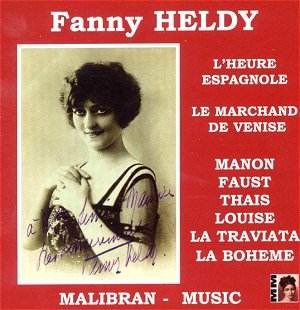The so-called Franco-Belgian
Violin School has its inevitable vocal
analogue. Held to be a quintessential
exponent of the French repertoire Fanny
Heldy was, as was Marcel Journet, a
superb Des Grieux and a frequent partner
of hers; actually Belgian born. She
was christened Marguerite Deceuninck
in Ath, near Liège in 1888. She
studied there before gravitating to
Brussels, and then during the First
War to Paris. She then began an almost
uninterrupted series of successes, giving
new works and old, and premiering those
by Honegger, Ibert and Hahn amongst
many others and along with Vallin, Vix
and Lubin was one of the adornments
of inter-War Parisian musical – and
indeed international – life. We are
fortunate that she left a reasonable
number of recordings; her biggest undertaking
was probably the first complete Manon,
of which one record is reproduced in
this disc, which was recorded on 48
78-rpm sides in 1923 for Pathé.
The discs take us up to 1936 only because
two years later she married and retired.
The sides collated
by Malibran show all her many virtues.
Take the opening Ravel; charm but a
technique to support it, open vowel
sounds, flighty characterisation. Or
the Hahn, with the composer conducting,
where she evinces a splendidly sustained
bottom register and employs portamenti
deliciously; she is here the embodiment
of coquettish conversationality. In
the Verdi – sung as with everything
here, as was the custom of the day,
in her native language - we can hear
her fine legato, with a full complement
of diminuendi and portamenti; also that
rather girlish tone - soubrettish would
be too trivialising a word but it has
the potential. Hers was very definitely
not a heavy voice and her Verdi relies
on elfin characterisation than on expressive
power. The recording also underlines
– or exaggerates – something else about
her voice, which is that it can take
on a somewhat metallic ring, something
that becomes evident through the range
of these recordings.
Her partners here are
the excellent Journet and the still
noble but increasingly elderly and lugubrious
Fernand Ansseau (he died in 1933, just
a few years after these sides were made).
In these duets and trios Journet is
superb in Manon, recorded around 1928
and good in the final trio from Faust,
where Heldy is somewhat less impressive
– just too strident for comfort. The
souvenir of that earlier 1923 Manon
is in the form of Pathé 1730,
which convinces through Heldy’s innate
charm and effortless stylishness. I
don’t think it’s a fanciful by-product
of the late acoustic recording technique,
but her voice sounds lighter than it
was to sound a decade later and she
has no need at all to force her tone.
The copies used are slightly rough but
perfectly serviceable.
The booklet is in French
and English with a concise biography
of the singer and some delightful period
photographs, all of which enhance a
welcome addition to the catalogue. I
should add in conclusion that the complete
1923 Manon is currently on Marston (excellently
transferred) and that her recordings,
along with those of Journet are collated
on the same label. Pearl also has a
number of her sides, mainly devoted
to the Ansseau recordings. If you don’t
have the Marston discs this Malibran
is a good bet.
Jonathan Woolf

